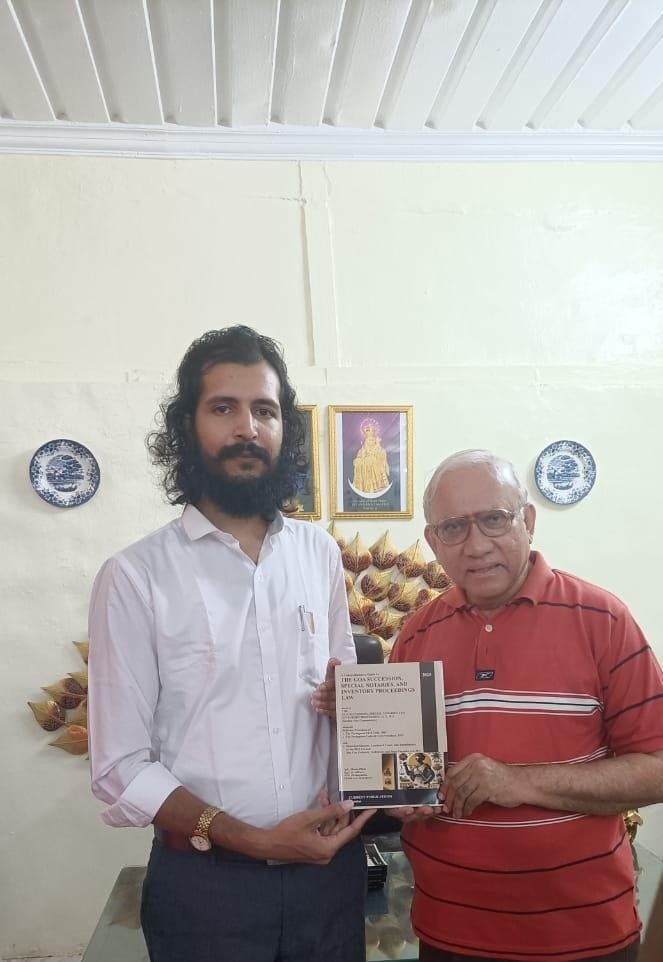
On 14th September, a significant cultural and legal milestone was marked in Margao with the release of a Comprehensive Guide to the Goa Succession, Special Notaries and Inventory Proceedings Law by Advocate Moses Pinto. The ceremony took place at Casa Antonio, Pinto in Vidyanagar, Margao.
The release was graced by Advocate F. E. Noronha, who formally unveiled the book. The choice of venue was deeply symbolic. Casa Antonio, a two-century-old house originally built by the renowned Margao businessman Paulin Rodrigues, the author’s great-grandfather, has stood as a silent witness to Goa’s colonial past and was present during the Liberation of Goa on December 19, 1961. For Pinto, launching the book here represented a conscious effort to align the preservation of Goan heritage, both cultural and legal, with the legacy of family inheritance.
The gathering was enriched by the presence of Pinto’s 88-year-old grandmother, Maria Ivone Souza Rodrigues, the matriarch of the house. She is the daughter of the late Advocate Emidio Souza, who served as the lawyer of Banco Nacional Ultramarino in Goa during the Portuguese colonial era. Also present was the author’s maternal uncle, Evans Rodrigues, son of Antonio Aleixo Rodrigues, from whom the ancestral home takes its name. Completing the intergenerational presence were the author’s cousins Anapaula, Antonio, Helen, and Shane Rodrigues, who symbolised the continuity of heritage as the upcoming generation of heirs entrusted with the conservation of ancestral mores and values.
The book is positioned not merely as an academic text but as a practical treatise to safeguard inheritance rights and preserve ancestral estates for Goans. With rising concerns about the fragmentation of property and the dilution of family estates, Pinto’s work draws attention to the enduring relevance of codified succession laws in Goa. By tracing the origins of succession and inventory proceedings to Portuguese-era laws, the book provides a contextual framework that links historical statutes with their modern adaptations.
In its literature review, the book examines the Portuguese Civil Code of 1867 and the Portuguese Code of Civil Procedure of 1939, comparing them with the Goa Succession, Special Notaries and Inventory Proceedings Act, 2012. Through this comparative lens, Pinto demonstrates how laws originally drafted in colonial Europe were adapted to the realities of Goa, Daman and Diu. The result is a comprehensive exploration of how codified inheritance frameworks evolved into what jurists across India now hail as the country’s first Uniform Civil Code, functioning uniquely within the Goan context.
Advocate Noronha, in his review of the book, described Pinto as “a cultured lawyer with the mind of the Renaissance,” observing that the work is a refreshing departure from the conventional mould of legal writing. According to Noronha, the book combines historical background, case law, and legislative amendments with an accessible structure, serving both as a handbook for practitioners and a guide for citizens. He noted the meticulous effort of referencing corresponding provisions of the Portuguese Civil Code after every section of the Goan statute, thereby bridging legal continuity across centuries.
Noronha was particularly appreciative of the book’s inclusion of landmark cases and its examination of controversial legislations such as the Goa Escheats, Forfeitures and Bona Vacantia Act, 2024, often referred to as the Land Grab Act. In his words, this compact yet comprehensive work offers clarity, guidance, and a much-needed cultural grounding in a legal field that has too often been dismissed as technical or inaccessible.
The event at Casa Antonio was attended by close family, friends, and legal colleagues, reflecting the intimate yet historically rich setting chosen by the author. Pinto remarked that the release in his ancestral home was intended to reinforce the book’s central theme, the safeguarding of heritage through law.
With this publication, Advocate Pinto adds a new dimension to Goan legal scholarship, one that integrates history, culture, and jurisprudence in equal measure. The book promises to become an essential reference for lawyers, notaries, judges, and citizens keen on understanding the complex yet vital area of succession law in Goa.